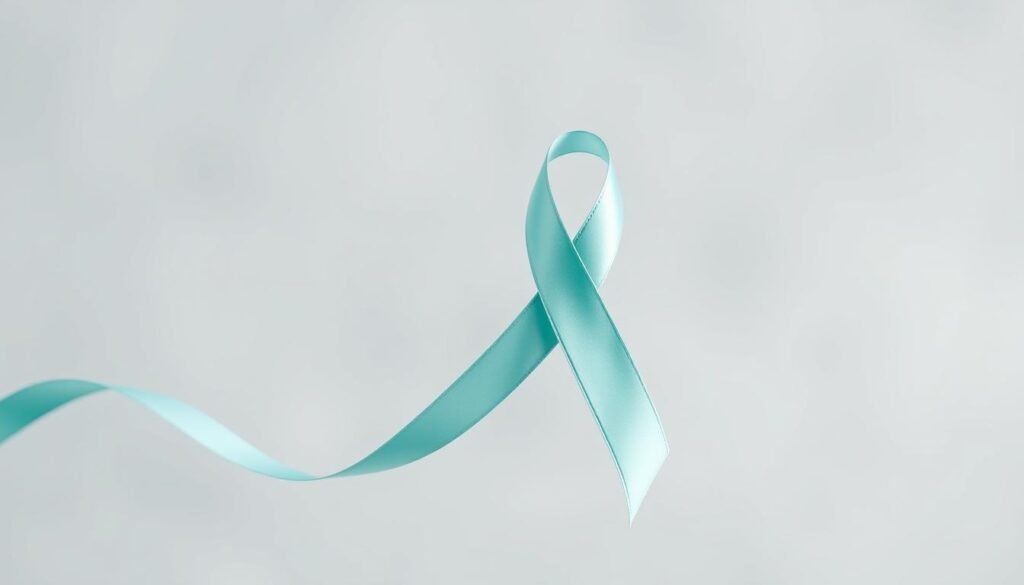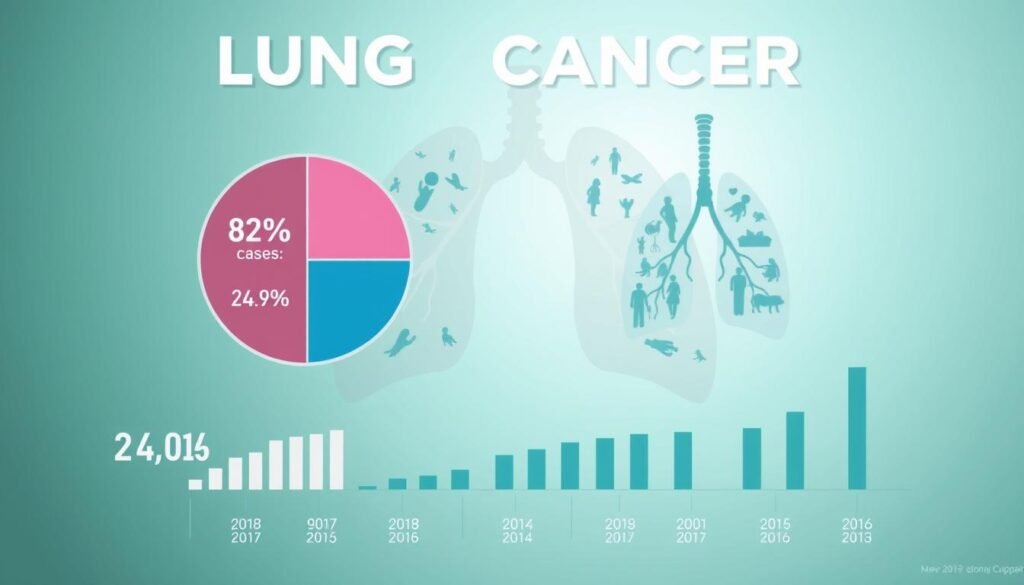Did you know that lung cancer causes about 20% of all deaths from cancer? In 2022, there were a shocking 236,740 new cases in the US, showing a big need for awareness. The lung cancer ribbon color is a critical symbol. It helps support those affected by this disease. It also helps fight against the wrong belief that only smokers get lung cancer. This support guide is here to teach you why the lung cancer ribbon is so important. It can bring people together to support those dealing with lung cancer.
Lung cancer is the top reason for cancer-related deaths across the globe. It’s crucial to support initiatives that help with research and patient support. They also teach the public about the complexities of lung cancer. Wearing the lung cancer ribbon means you’re part of a larger discussion. It’s about showing understanding, kindness, and advocacy for affected families.
Key Takeaways
- The lung cancer ribbon color symbolizes support and awareness for lung cancer patients.
- Over 236,000 new lung cancer diagnoses were made in the US in 2022.
- Lung cancer is the leading cause of cancer-related deaths worldwide.
- A significant portion of those diagnosed are non-smokers or former smokers.
- The lung cancer ribbon promotes understanding and combats stigma.
- Lung Cancer Awareness Month is observed in November to promote education and support.
The Significance of the Lung Cancer Ribbon
The lung cancer ribbon is key in making more people aware of lung cancer. It shows unity and sparks talks on symptoms like coughing and shortness of breath. It also challenges myths, showing that lung cancer can happen to anyone, not just smokers.
Raising Awareness About Lung Cancer
Lung cancer awareness aims to highlight how common this disease is and stress the need for early detection. The pearl or white ribbon is a symbol of this fight and helps bring people together. The goal is to push for better treatments and fund research.
With over 50 ribbon colors for different cancers, there’s a big support network. Lung cancer is part of this, honoring those touched by the disease. For information on cancer ribbon colors, check out this guide.
Supporting Individuals Affected by Lung Cancer
It’s crucial to support those diagnosed with lung cancer. The ribbon helps build a support system. It helps raise awareness and guide patients and families toward resources and support.
Many groups offer help, giving patients more time to focus on getting better. This aid is important for those going through treatment.
What Is The Lung Cancer Ribbon Color
The lung cancer ribbon color is a key symbol in fighting this harsh illness. It shows the main colors linked to lung cancer and discusses the color debates. This helps us see how people are working hard to make others aware.
The Traditional Colors
The usual colors for lung cancer awareness are white or pearl. These cancer ribbon colors stand for purity and hope. They show we are all together in this battle. The white ribbon got popular in the 1990s. It is especially seen in Lung Cancer Awareness Month every November. Then, many people and groups wear these ribbons to show support.
The Debate Over Color Choices
Even though the white ribbon is well-known, there’s still a debate over colors. Some groups want new colors to make lung cancer more noticeable. These talks about lung cancer symbols show a deep wish to connect better with everyone. They also want to highlight how serious lung cancer is. This talk among lung cancer advocacy groups shows how crucial it is to be united in raising awareness and backing research.

Lung Cancer Awareness Month: A Time to Stand Together
Lung Cancer Awareness Month highlights the battle against lung cancer. It calls for everyone to take part. Starting in 1995, it went from a single day to a full month of activities. These efforts educate and support those touched by lung cancer. The white ribbon now stands as a symbol of this cause. It shows our commitment to help and fund research.

The History of Lung Cancer Awareness Month
The history of Lung Cancer Awareness Month shows how awareness has grown. It began small but quickly sparked global action. Communities came together to spread knowledge about lung cancer. They shared about its risks, symptoms, and treatments available. This brought people together. They stressed the importance of catching the disease early and taking preventive steps.
Key Events During Lung Cancer Awareness Month
In Lung Cancer Awareness Month, many events help spread the word. Examples are Cancer Survivor Day and Women’s Lung Health Week. They provide a stage for sharing stories and discussing lung cancer. These events build community support. They help patients and families connect. They also highlight the continuous need for research and advocacy.
Want to help? To get involved in these events, visit Lung Cancer Awareness Month. This month boosts visibility and stress on healthy living. That way, we all move closer to beating lung cancer together.
Understanding Lung Cancer: Statistics and Facts
Lung cancer is a major health issue, highlighted by lung cancer statistics. These stats play a big role in current health talks. They give us new insights into lung cancer and what causes it.
Current Statistics on Lung Cancer Cases
Lung cancer leads to many deaths in the US. It’s one of the top causes of cancer deaths. In 2022, around 236,740 new cases and 130,180 deaths were reported. This situation highlights the need for more lung cancer awareness. Interestingly, more women are being diagnosed than men nowadays.
Impact of Smoking and Other Risk Factors
The role of smoking impact in lung cancer is huge. However, it’s noteworthy that a big number of people with lung cancer were not smokers. Other big risk factors include radon gas, secondhand smoke, and pollution. It’s vital to spread awareness about these risks. This can help people take steps to prevent it and live healthier.

Lung Cancer Symbols and Their Meanings
Lung cancer symbols are vital for showing support and raising awareness. The white or pearl ribbon stands for purity, hope, and a new beginning for those fighting lung cancer. It is both a beacon of hope and a call to action for survivors and those affected by the disease.
Recognizing these symbols helps build a community spirit among people dealing with lung cancer.
Beyond the Ribbon: Other Symbols of Support
There are more symbols besides the well-known white ribbon. These symbols are powerful. They show the collective fight against lung cancer with hope. Many cancer groups use these symbols to help with their fundraising. This raises awareness and supports research and care for patients.
Actions like wearing a ribbon, going to events, and teaching others about early detection can make our community stronger in this fight.
Comparing Lung Cancer Symbols to Other Cancers
Each cancer ribbon color means something unique. For example, pink is for breast cancer and teal for ovarian cancer. Knowing this helps us see the variety in advocacy for different cancers. These symbols, including those for lung cancer, bring people together in their fight against all cancer types.
This unity boosts overall awareness and promotes early screenings. For info on early signs, check this resource. It shows why detecting cancer early is crucial for better outcomes.
Lung Cancer Advocacy and Support Groups
Lung cancer advocacy is crucial in supporting those hit by this tough disease. Many groups work hard to offer support and spread knowledge. They aim to positively impact patients and their families during this hard time.
Top Organizations Supporting Lung Cancer Awareness
Key players like the American Lung Association, Dusty Joy Foundation, and GO2 Foundation stand strong for lung cancer support. They tackle advocacy, fundraising, and education. These charities shine a light for those affected, offering key resources and info.
How Advocacy Groups Make a Difference
Advocacy groups push for greater awareness about lung cancer. They highlight the need for early detection and quick action. They also work to get funding for research and better care for patients.
Their work helps families find support and strength. They use social media to fight the stigma around lung cancer. This opens up a caring and understanding conversation in our communities.
Lung Cancer Fundraising and Charities
Fundraising efforts against lung cancer are crucial. They involve many initiatives to raise awareness and funds for key programs. Events like charity walks, online campaigns, and awareness drives are common. They bring people together and build a sense of unity.
Types of Lung Cancer Fundraising Initiatives
In the USA, various fundraising activities support lung cancer research and care. There are:
- Charity walks that encourage community participation
- Auction events featuring donated items and experiences
- Online campaigns utilizing social media for broader reach
- Athletic events like marathons and fun runs, promoting health and wellness alongside fundraising
Supporting Lung Cancer Research Through Donations
Making donations to lung cancer charities is essential. It supports vital research and new treatments. These donations help with studies in genetics, new treatment methods, and prevention. Donors and corporate sponsors are key in bringing hope to those affected by lung cancer.
| Type of Initiative | Description | Purpose |
|---|---|---|
| Charity Walks | Community events that gather participants to walk for awareness | Raise funds and visibility for lung cancer |
| Auction Events | Events where participants bid on donated items | Generates funds for research and patient support |
| Online Campaigns | Using digital platforms for fundraising efforts | Engage a wider audience and facilitate donations |
| Athletic Events | Marathons or fun runs focused on health and fundraising | Promotes health while raising funds for lung cancer research |
How to Wear the Lung Cancer Ribbon
The lung cancer ribbon is a pearl-colored symbol that stands for hope and support. It is worn to show unity with those touched by lung cancer. Wearing it symbolizes your commitment to cancer awareness.
Ways to Incorporate the Ribbon into Daily Life
Adding the lung cancer ribbon to your daily routine can help spread the word about lung cancer. Here are some tips on how to do it:
- Clothing: Pin the ribbon to your clothes, like jackets, shirts, or caps.
- Accessories: Add it to your jewelry or key rings.
- Themed Events: Take part in or arrange lung cancer awareness events. Motivate everyone to wear the ribbon.
- Social Media: Post photos wearing the ribbon. Use hashtags to start conversations online.
- Personalized Ribbons: Get ribbons made with special messages. It makes your support even more meaningful.
Choosing to wear the lung cancer ribbon often makes a strong statement. It shows you care about early detection and treatment. It also starts important talks about lung cancer. Wearing it reminds us that every small effort helps in the battle against this disease.
| Method | Impact |
|---|---|
| Clothing | Makes your support visible every day. |
| Accessories | Sparks discussions on lung cancer awareness. |
| Themed Events | Creates a support network. |
| Social Media | Expands the reach through digital shares. |
| Personalized Ribbons | Gives a personal angle to the message. |
Conclusion
The lung cancer ribbon is usually white or pearl. This color stands for purity, hope, and a new beginning for lung cancer fighters. It is crucial because lung cancer is a leading and deadly cancer across the globe. Getting the word out is vital.
Through communities working together, we can boost understanding and support for those hit by this disease. It highlights the importance of knowledge and catching the disease early.
Support for lung cancer research and help programs is what advocates focus on. Their work shows how crucial support is in this battle. By getting involved in awareness events and talking about lung cancer, they do more than spread the word. They are part of a bigger action needed for change.
The white or pearl ribbon is a strong signal to get involved. It unites survivors, patients, and backers, offering hope and support. By pushing for awareness and better research and help, there’s a brighter future for those dealing with lung cancer.